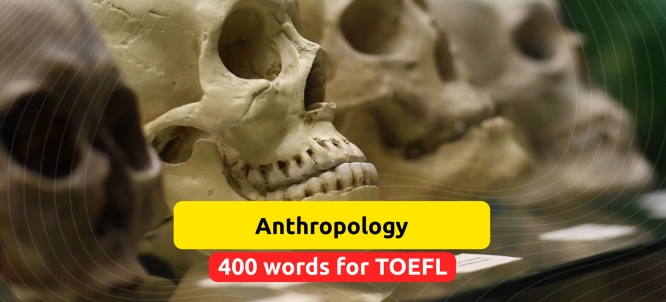by PushtoLearn
Anthropology
Table of Contents
Anthropology Flashcards - Vocabulary Practice for TOEFL
These exercises focus on Anthropology Vocabulary
List of Anthropology Words for the TOEFL
|
Word |
Definition |
Example |
|
Assimilate |
To absorb and integrate into a culture or group. |
Immigrants often assimilate into the dominant culture over generations. |
|
Cremation |
The act of burning a body as part of a funeral rite. |
Cremation was a common practice in many ancient societies. |
|
Domesticate |
To tame animals or cultivate plants for human use. |
Early humans learned to domesticate wolves, leading to the modern dog. |
|
Folklore |
Traditional stories, customs, and beliefs passed through generations. |
The folklore of the region includes tales about mythical creatures. |
|
Fossilize |
To preserve something as a fossil or make it rigid over time. |
The bones began to fossilize after being buried for centuries. |
|
Relic |
An object surviving from an earlier time, often with historical significance. |
The museum displayed relics from the ancient city. |
|
Rite |
A ceremonial act or procedure. |
Coming-of-age rites are common in many cultures. |
|
Ritually |
In a way that relates to or follows a ritual. |
The tribe ritually celebrates the harvest every year. |
|
Saga |
A long story, often about historical or legendary events. |
The saga of the Viking warriors has been passed down for generations. |
|
Vestige |
A trace or remnant of something that once existed. |
Archaeologists found vestiges of ancient settlements in the desert. |

Usage in TOEFL Exam Formats
Reading Section
-
Words like relic, rite, and assimilate often appear in passages discussing cultural practices or historical discoveries.
-
Example Question: What does the passage imply about the relics found at the site?
Listening Section
-
Terms such as folklore, fossilize, and ritually are common in lectures on anthropology or cultural studies.
-
Example: “Folklore provides insight into the values of ancient communities.”
Writing Section
-
Use advanced words like vestige, domesticate, and saga to enhance your essays.
-
Example Sentence: “The domestication of plants was a pivotal moment in human history, leaving vestiges of early agriculture in archaeological sites.”
Speaking Section
-
Employ terms like cremation, assimilate, or saga to articulate ideas during speaking tasks.
-
Example: “The cremation rituals of ancient cultures often reflect their beliefs about the afterlife.”
Common Mistakes
-
Confusing "Assimilate" with "Adapt":
-
Mistake: "People adapt into a new culture quickly."
-
Correction: "People assimilate into a new culture quickly."
-
Misusing "Cremation" for Burial:
-
Mistake: "The burial involved cremation in a coffin."
-
Correction: "The funeral involved cremation, not burial."
-
Overgeneralizing "Folklore" to Mean History:
-
Mistake: "Folklore records the actual events of the past."
-
Correction: "Folklore often includes myths and exaggerated stories passed down orally."
-
Using "Fossilize" Figuratively Without Context:
-
Mistake: "The ideas fossilized quickly in the debate."
-
Correction: "The bones began to fossilize due to the environmental conditions."
-
Confusing "Vestige" with Evidence:
-
Mistake: "The footprints were vestiges of a crime."
-
Correction: "The pottery fragments were vestiges of an ancient civilization."
FAQ
What does "assimilate" mean in cultural contexts?
"Assimilate" refers to the process of integrating into a culture or group, often adapting behaviors and customs.
How is "cremation" different from burial?
"Cremation" involves burning the body as part of funeral rites, whereas burial involves placing the body in the ground.
What’s the significance of "folklore" in anthropology?
"Folklore" preserves traditional stories and beliefs, providing insight into the values and practices of cultures.
What does "ritually" imply about an action?
"Ritually" means that the action is performed as part of a ritual, often with symbolic or ceremonial significance.
Can "vestige" refer to modern objects?
No, "vestige" typically refers to remnants or traces of something from the past, such as ancient artifacts or ruins.

